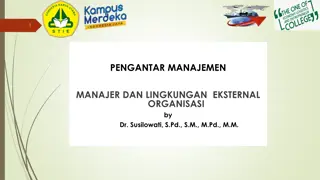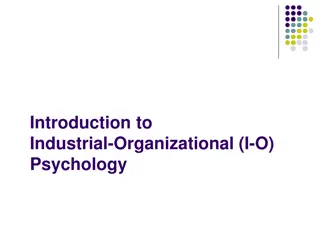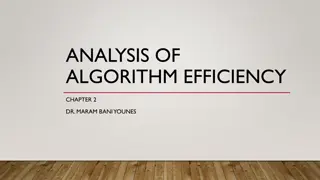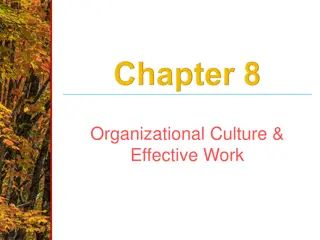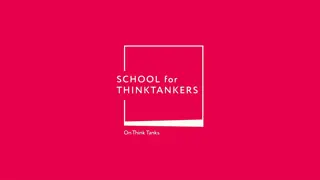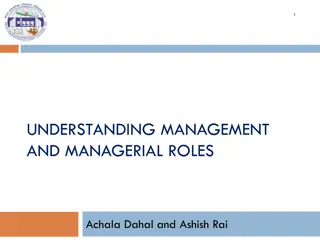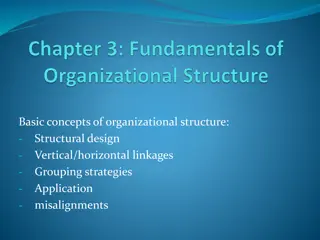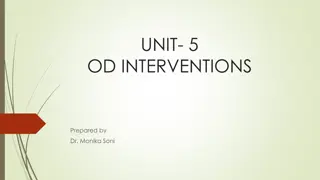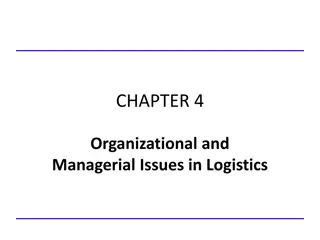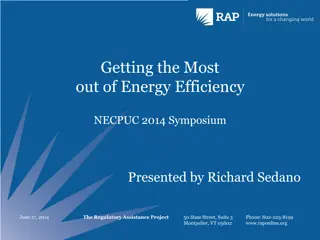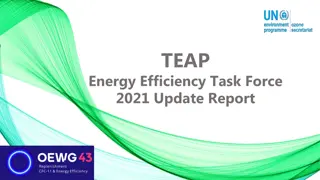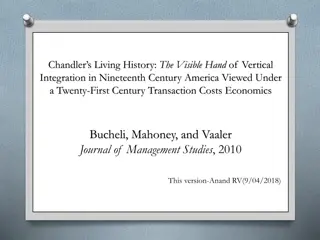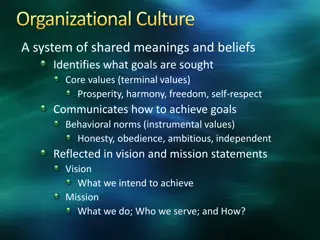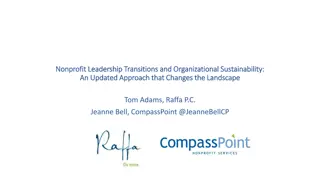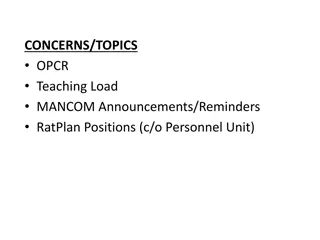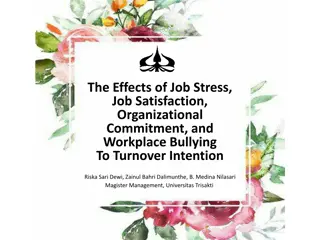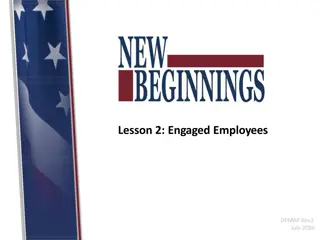Enhancing Expertise Management for Organizational Efficiency
Explore the capabilities of the MCM Expertise Locator tool and learn valuable insights applicable to enterprise solutions. The project aims to automatically extract staff information, combine it with self-declared expertise, and present it in a user-friendly dashboard for easy access. Targeted at HR teams, managers, project leaders, and staff seeking collaboration, this initiative provides a structured approach to identify and utilize staff expertise effectively.
Download Presentation

Please find below an Image/Link to download the presentation.
The content on the website is provided AS IS for your information and personal use only. It may not be sold, licensed, or shared on other websites without obtaining consent from the author. Download presentation by click this link. If you encounter any issues during the download, it is possible that the publisher has removed the file from their server.
E N D
Presentation Transcript
MCM Presentation to SPR (digital workplace), Knowledge Management Unit, Skills Shed (winning idea), HR1 team, Talent Inventory team, COM (eLibrary), and RES (IMF researchers site). By Claudia Jadrijevic and Emeric Lai Tim September 4, 2018
Showcase the capabilities of the MCM Expertise Locator Discuss the lessons learned that could be useful for an enterprise solution
Team Claudia Jadrijevic (author) MCM Emeric Lai Tim (developer) MCM Jing Zhong and Linda Venable (partners) IMF Joint Library Partners on the work to filter staff external publications
Goals Extract information about staff automatically from already existing data sources Complement this information with self-declared areas of expertise and languages Organize and display the information in a dashboard Make it easily searchable Google-like Let the users consume the data and assess the expertise
Uses HR teams looking to staff missions Managers looking to hire people Project leaders looking to form a team Staff interested in connecting with others working on similar topics Teams looking for specific areas of expertise curiosity (competition is good!)
Who Economists Financial Sector Experts Managers Assistants Other career streams: Human Resources Capacity Development (TA) Budget Knowledge & Information Management Technology
Identifying staff expertise Self-declaring areas of expertise can be biased, may lead to too much or too little Assigning areas of expertise can be biased, is time consuming Keeping areas of expertise in a database is time consuming, easily becomes out of date Differentiating between areas of expertise and skills is important and complement each other
Future This project is easily scalable to include all Fund staff. It will require some resources and effort to clean up the data needed anyway for future projects including the Digital Workplace, HR1 project, and others. With a little investment we could install an intelligent software that ingests all information, processes it, and uses algorithms to narrow down and rank staff expertise.
Data Sources: MySite. Basic information, i.e. department/division, title, email, phone. MCM Policy Responsibilities. Staff assignments to different policy areas, i.e. central bank governance, inflation targeting, Islamic banking and finance, macroprudential policy. MCM Country Responsibilities. Staff assignments for country work, i.e. team lead, country manager, article IV participant. Travel Information System (TIMS). Country missions.
Data Sources continued Self-declared areas of expertise. Staff select from the Enterprise Business Vocabulary (EBV) the economic topics they have expertise with, plus other skills. Self-declared language(s). Institutional Repository (IR). Internal papers and TA reports. External Publications. Curated staff CV in electronic format, including a biography, education and work experience. Internal documents from eDocs DM.
LIVE DEMO! Let s Dive In
Lessons learned (1) ALL DATA SOURCES: Use staff name from IMF active directory MySite. Incomplete information. Not user friendly. Staff won t use it. MCM Policy Responsibilities. Data in multiple Excel spreadsheets, moved to a database format in SP. MCM Country Responsibilities. Data in multiple Excel spreadsheets, duplicate entries, spelling errors, parts out-of- date, moved to a database format in SP.
Lessons learned (2) Travel Information System (TIMS). Allowed to filter only 10 years. Allowed to filter only the period when staff are working in MCM. Assignment codes (mission topics) are too general, too few, do not reflect the exact topic of the mission. Staff roles are too general, too few, do not reflect the exact role of staff on the mission. No process to perform quality control in place. Prone to human error.
Lessons Learned (3) Self-declared areas of expertise. Pilot included 55 people. Different suggestions: a) pick as many as needed from EBV is good; b) narrow the selection to 3 top areas of expertise from a pick list of 6-10; b) expertise needs to be vetted by managers; c) expertise should be identified by managers; d) expertise is one thing and skills is another they complement each other should also require staff to select a skills set.
Lessons Learned (4) Self-declared language(s). Easy. No need to declare the proficiency level. Reputational risk if declared incorrectly. Institutional Repository (IR). Metadata for authors is largely incomplete or incorrect. Author(s) field needs to be mandatory. Majority of older documents do not have an author, or author s name was misspelled. MCM backfilled the metadata for TA reports using text mining.
Lessons Learned (5) External Publications. Partnered with the experts at the IMF Library (J. Zhong and L. Venable). Selected to use ORCID to create an electronic CV for 36 people (pilot) and extracted the publications into the expertise locator (clean and easy!). ORCID is a unique identifier that solves author name disambiguation problem. The CV is created, curated and updated by the person and moves wherever the person goes go. Updates can be pushed back into ORCID. People can select the level of visibility of each publication. It will be used by COM on all IMF publications in eLibrary and many open science companies like Google and RePec already use it. Good and solid API, easy to mine. ORCID has many benefits. Ideally adopted by all staff. For more information refer to ORCID video
Lessons Learned (6) Internal documents from eDocs DM. Metadata for authors is largely incomplete or incorrect. MCM backfilled the metadata.
SEARCH CAPABILITIES Sample Size - All MCM Staff for missions, responsibilities, documents - 73 Self-declared profiles - 36 ORCIDs (external publications)
Sample Search Results 1: Keyword search on all content
Sample Search Results 2: Combine language skills with areas of expertise
Sample Search Results 3: Combine Country, Type of Mission and Mission Topic
Sample Search Results 4: MCM Policy Responsibilities by Area/Topic
Sample Search Results 5: MCM Country Responsibilities
Sample Search Results 6: MCM Regional Advisors or Art.IV Participants or B4-sign off
Sample Search Results 7: MCM Management
THANK YOU! Questions


